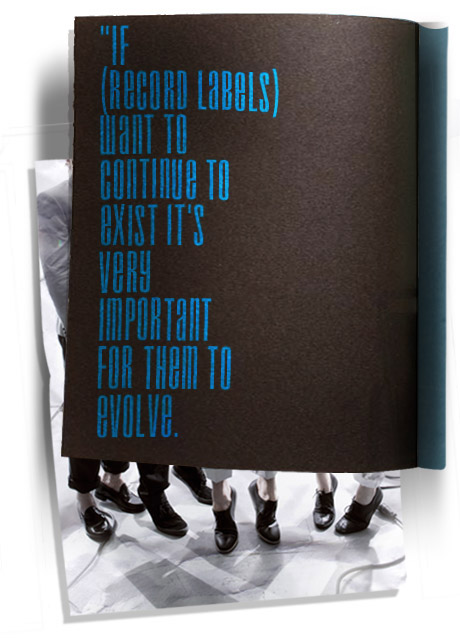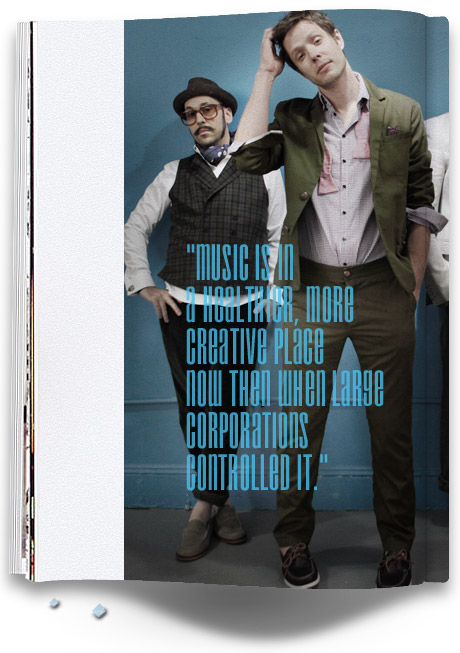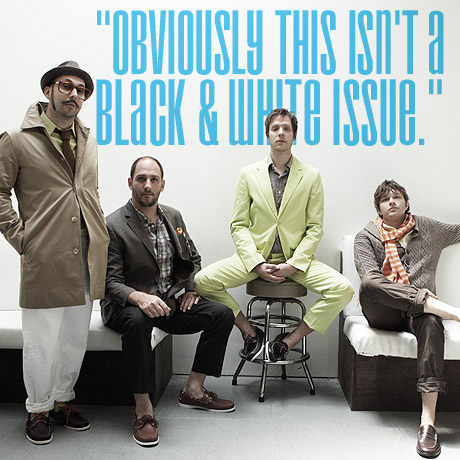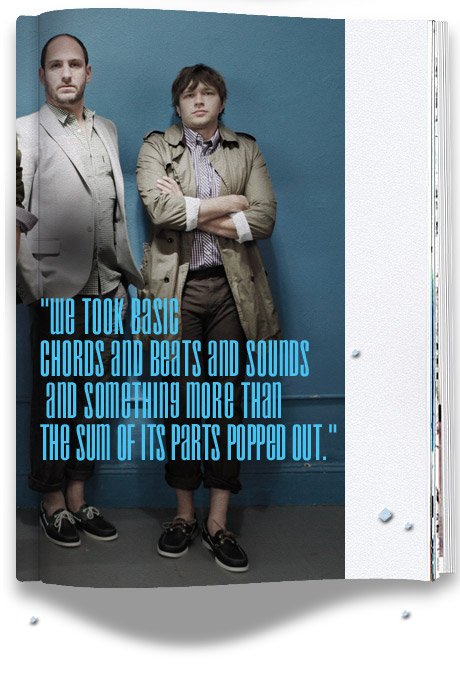It’s easy to glance at OK Go, and just see a quirky band with a penchant for making charmingly odd videos.
In 2006 they released the video for the first single off their Oh No album on a then-fledgling site called You Tube. Choreographed by front man Damian Kulash’s sister, the shoestring budget video for “A Million Ways” went viral – with more than 51 million views to date – brought a level of exposure most bands dream of and showed how important the Net had become as a means for bands to reach a wider audience.
Kulash has said in the past that their videos weren’t part of any scheme to actively pursue a viral campaign, but the Internet seems to love creativity, and the band recently added another notch to their belt when they uploaded the video for “This Too Shall Pass” – with a kick-ass, two-storey Rube Goldberg machine built with the assistance of NASA engineers – and it too went viral. That one has over 14 millions views on You Tube to date.
But they knew that reaching those heights on You Tube wasn’t enough. When there’s an appetite for your product you need to get it to as many people as you can, so they wanted to allow their videos to be embedded on any given site. Their label didn’t.
Calling from his home in L.A., Kulash explains why the ability to embed their videos at will was so important: “It’s basic mechanics, it’s how the Internet works,” he explains. “There’s vastly more material uploaded on You Tube every minute than can be watched, so most of what’s out there just goes out there and sits there.”
The singer boils it down to a fundamental idea: people want viewers to stay on their sites and not be required to leave to view something elsewhere. “There’s no hope of people paying attention to your music video if you don’t let others use it,” affirms Kulash.

And lo and behold, as soon as the band broke ties with EMI and Capitol to form their own indie label – Paracadute Recordings – everyone and their brother were able to embed OK Go videos on their sites.
Their decision to freely allow the embedding of their videos is just one of the diverging paths the band and major record labels walk. While the band have embraced the digital world in which musicians now operate, the major record labels are stuck in the past, though, as Kulash predicts, archaic label policies won’t be able to stave off a paradigm shift for much longer.
“If [record labels] want to continue to exist it’s very important for them to evolve,” he says. “Their entire business model is based on the sanctity of the master recording … but now there’s lots of ways to make money off recordings – using them in commercials, even use on the Internet requires some licensing, and of course there’s making money by sales, merchandise, and all sorts of things – but what was once the largest [revenue] stream for the recording industry for 80 or 100 years suddenly became the smallest portion of business for a lot of bands, so if they want to continue they have to change their business model dramatically.”
And then there is the overall affect the Net has had on the music industry in general to consider.
“Music is in a healthier, more creative place now than when large corporations controlled it,” suggests Kulash. “I mean, plenty of people still make music because they think it’s going to make them money – that music sucks – and people have always made music because they love it. The difference now is not that there are better incentives for people to be more creative, it’s that there are better outlets for people who are creative.”

And as the ever-articulate and plugged in Kulash goes on to discuss the role of record labels in the music industry – distribution, promotion, and start-up capital – and how those traditional roles no longer need to be filled exclusively by a label, one nearly forgets he fronts a band that once played a gig with their heads submerged in large, water-filled bowls.
The ‘quirky, creative musician’ persona recedes into the body of an enigma when Kulash starts to talk about Internet neutrality.
For some time now Kulash has been a vocal advocate in the push for Net neutrality – since appearing before Congress in 2008 on the subject – and continues to work with various political advocacy groups, members of the FCC, and even the White House in an attempt to ensure the Internet doesn’t go the way of cable television.
The basic principle of Internet neutrality is that there should be no restriction on the level of access or modes of communication between users paying for equal service by internet providers. Or, put a different way, it’s the idea that those who lay the fibre-optic lines shouldn’t have control of what information goes over them. For a far more eloquent and in-depth explanation, check out some of the Op-Eds Kulash has written.
On a recent trip to Washington, D.C., Kulash met with the FCC Commissioner, and the following day a major announcement was made.
“I certainly don’t want to take credit for the work of a lot of people,” clarifies Kulash. “We work with various political advocacy groups – but the day after we met with the FCC Commissioner it was announced that they were going to reclassify the Internet under Title 2 (of the Telecommunications Act), which is a short term goal we had planned.”
Of course there’ll be months of haggling by those in Congress, lobbying by the major telecommunication corporations, and fierce debate on both sides of the political spectrum, but should the FCC continue along their current path the principle of net neutrality may one day be enforceable under the same regulations that govern telecommunications.

“Obviously this isn’t a black and white issue,” Kulash adds. “I think everyone understands that some network management is required, but the question is, ‘Can that be done in a non-discriminatory way?’”
As evident from their most recent album, Of the Blue Colour of the Sky, involvement in activities away from the studio hasn’t meant OK Go has ceased growing as a band. A departure from their first two records, the difference in Of the Blue Colour of the Sky is, according to Kulash, a product of the band’s approach to writing this time around. “We changed (our writing process) and got different results,” he says. “The last couple of albums we were more goal-oriented, we imagined a song and then built it, but when we tried writing this album that way – because we’ve been together and played as a band for so long – the things we were imagining were too similar to what we already wrote, we were repeating ourselves, or it was like we were covering ourselves, like an imitation, so we set out in another direction.”
Kulash voice is a breathless echo that reverberates over distorted synth-charged melodies and lyrics that range between a come-hither Madame and a contemplative goodbye Cherie. Stand up and dance or sit down and lounge, but don’t attempt to pore over a book while listening to Of the Blue Colour of the Sky. This is not a record to multi-task to. A consuming dose of pop, rock, and 80s electronic beats, OK Go’s new album is a fresh sound from a band synonymous with innovation. The album’s ethos according to Kulash: “Take the basic thrill of music and try to build on that. We took basic chords and beats and sounds and something more than the sum of its parts popped out.” Sounds about as simple as getting a bill passed on Capital Hill.
Fashion Editor – Gabrielle Swan Stylist – Leah Berkowitz Stylist’s Assistant – Ngoclan Tran Hair – Jamie Meiers Grooming – Eryn Lefkowitz











